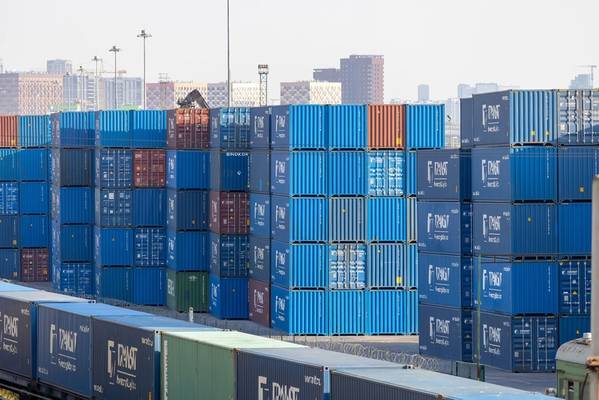
U.S. container imports surged in April as companies raced to avoid President Donald Trump's tariffs, which now include a 145% duty on goods from China, but executives at the country's two busiest ports said the trend looked set to reverse in May.
April container imports jumped 9.1% from a year earlier to top 2.4 million 20-foot equivalent units (TEUs), the second highest on record for the month, supply chain technology provider Descartes DSG.TO said on Thursday.
Imports from China, the top U.S. maritime trade partner, jumped 6.2% and accounted for 33.4% of all imports in April.
The 145% tariffs that Trump imposed on China on April 9 more than doubled the cost of goods from the country for U.S. consumers and prompted retailers like Walmart WMT.N, Amazon.com AMZN.O and other importers to pause or cancel some factory orders. Trump has also imposed 10% tariffs on many other nations and said those rates could go higher.
Import cargo at the Port of Los Angeles, the No. 1 U.S. seaport complex and the nation's leading gateway for goods from China, is expected to drop 35% year-over-year this week, said Gene Seroka, the port's executive director.
Overall May ship traffic could decline by roughly 20% as operators of hulking cargo vessels cancel scheduled voyages due to soft demand, Seroka added.
Many of the goods that enter the Port of Los Angeles and adjacent Port of Long Beach fan out across the mainland United States via truck and train.
Port of Long Beach CEO Mario Cordero expects May volume to fall 20% versus a year ago.
Elsewhere, shipping giant MaerskMAERSKb.CO said container volumes plunged 30-40% between the U.S. and China in April as a trade war erupted between the world's top economies, and it warned that a protracted dispute could shrink global volumes this year. Due to the time it takes to sail across the Pacific, the drop is likely to show up in U.S. import results in May.
When asked about the current cargo declines at West Coast ports and the ripple effects on longshore and trucking employment, Trump on Thursday told journalists: "That means we lose less money."
Trump did not elaborate how a drop in supplies of goods for Americans and the potential decline of any related duties would result in losing less money.
U.S. ocean imports are a closely watched gauge of health for the nation's economy because they include nearly everything Americans buy and inputs for many things domestic factories make. Historically, port volumes have fallen during economic downturns and global disasters, including the COVID pandemic.
Quickly evolving U.S. trade policies and retaliatory measures from U.S. trading partners as well as ongoing instability in the Middle East and Eastern Europe are raising the risk for global supply chain disruption, Descartes said.
"The full impact of tariffs — and the May 2 expiration of the de minimis exemption — has yet to be reflected in import volumes from China," Descartes said, referring to popular duty-free access for low-value shipments from China and Hong Kong.
(Reuters)


